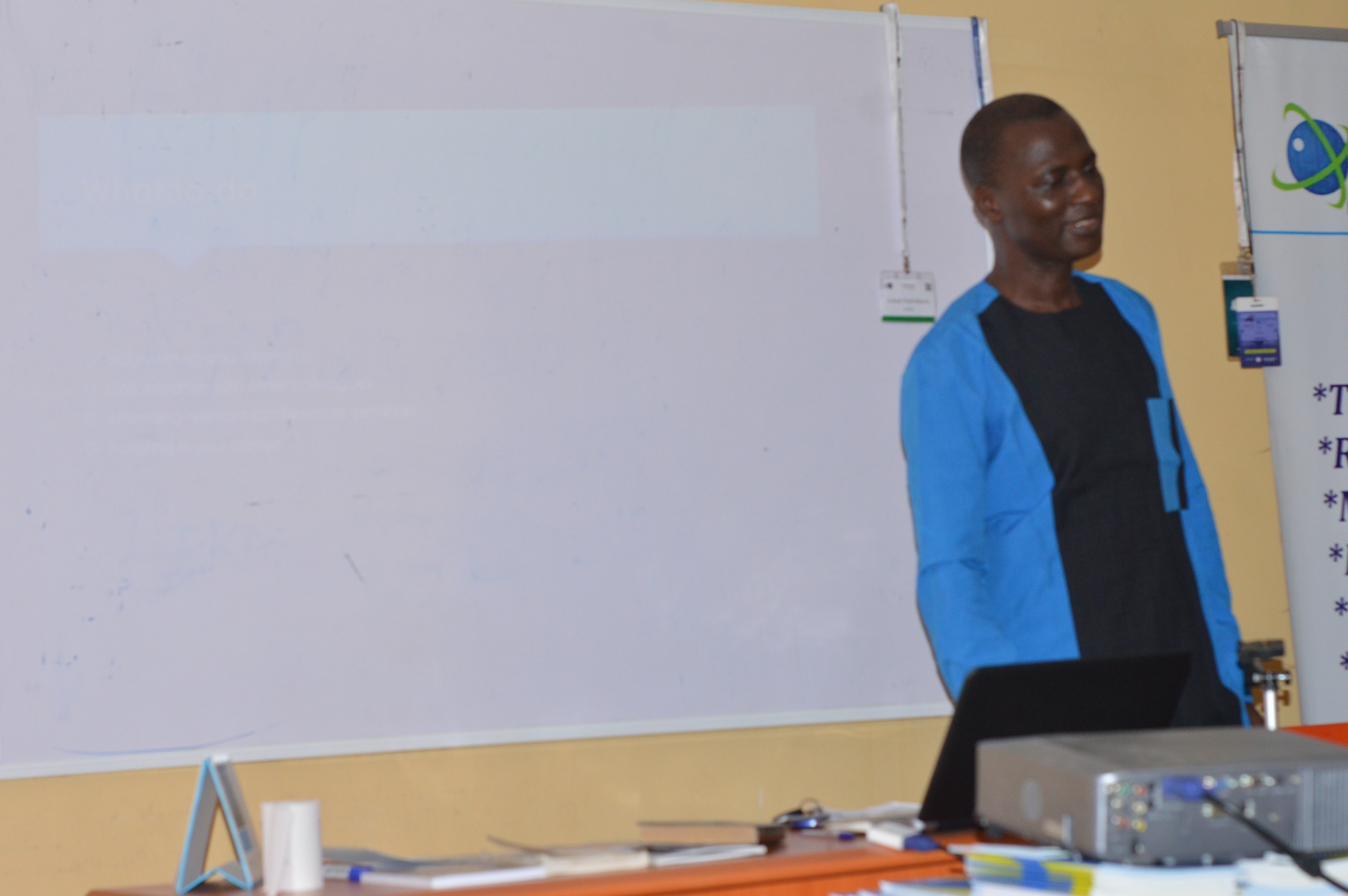ADESOLA IKULAJOLU, a student journalist writes on the major highlights of a recent training on media entrepreneurship by journalist and media career development specialist, Lekan Otufodunrin.
The media profession is not only a practice, but it’s also a means of livelihood for many. There is however the challenge of how well paying the profession is.
The current global Coronavirus pandemic is not only a big challenge for journalists; it is a big threat to the sustainability of media organisations and practitioners.
How then can media practitioners have a sustainable standard of living beyond relying on salaries and allowances at the workplace? This was the focus of what Mr Lekan Otufodunrin, a media expert and veteran journalist presented in a WhatsApp session held in celebration of his 56th birthday; organised by the Executive Director Nixxhash Communication, Adenike Fagbemi.
In case you missed the session, here are the highlights of what might interest you.
Speaking during the training for young journalists with the theme “Understanding and Perfecting Basic Media Entrepreneurship Skills And Trends”, Otufodunrin shared different experiences with participants with the sole aim of raising their consciousness on having an entrepreneurial mindset as they discharge their duties.
With the poor state of the economy and the digital disruption of the industry, it has become necessary for media practitioners in the print, broadcast and other aspects, to have an idea of what life would be outside the profession and what would happen if their monthly salary should stop coming or if they are retrenched.
Otufodunrin resigned his work from the prestigious THE NATION Newspaper as a Managing Editor of Online and Special Publication to start his personal media firm that focuses on training, research, mentorship, consultancy, as well as other media related issues. During the training, he explained how the vision to start Media Career Development Network (MCDN) came about and how he has coped with the challenge of running an outstanding venture outside the newsroom.
According to him, it is necessary that journalists must pay attention to the business side of their organisation while in paid employment.
He explained that a journalist can be entrepreneurial even while in full-time employment, noting that everyone cannot be an entrepreneur but it is important to know as many parts of the operations as possible.
“Everyone doesn’t have to be an entrepreneur. It may be better to get employment if you can as a young graduate to learn some things about running a business or an organisation. Some of us are not cut out for being entrepreneurs. Be sure you can before taking this route.
“You can be entrepreneurial in your work while in full employment. You putting in your best as if it’s your company. The way you do other people’s business is how you will do yours. You should pay attention to the business side of your organisation not just doing editorial work,” Otufodunrin said.
Let’s quickly delve into four of the major elements of turning media journalism into a profitable venture as explained by the media expert.
Understanding: As a budding media entrepreneur, you must ask yourself the question of how well you understand what you are doing. Having a good understanding of entails getting to know beyond the ordinary things others are doing.
It is easy for Journalists to resign their work to start their own platform, but how much understanding do they have about running the platforms.
According to Otufodunrin, it is not good enough that many online platforms are operated with analogue mentality and content are not optimized as they should.
“ You say you are a media consultant. How much do you know beyond calling your friends for press conferences and helping to kill stories? How well can you write a standard proposal? “ Otufodunrin asked as he stressed the need for a good understanding of any terrain journalists want to veer into.
Perfection may be hard to achieve, but it’s important to strive for it to succeed as an entrepreneur. “ It might be quite easy to offer services like everyone else, but how well have you mastered what you are doing or what you are planning to go into?. To have an entrepreneurial mindset, you must improve in what you do, the service you offer and be confident that you can offer quality services at any time,” Otufodunrin stated.
According to him, “You must ask yourself if you are able to outclass your competitors when it comes to offering services.
“How different is the quality of your service this year compared to last year to give you an edge when you have to bid?”
“Are you getting the necessary latest equipment to meet the global standard of your clients who cannot continue to patronise you because you are the friend of the Corporate Affairs Manager?. This means that there is a need to master all the needed skills.”
Trends: Every day there are new trends, there are new inventions, there are new discoveries and there are new ideas which an entrepreneur must be abreast of. You must learn to follow trends and be updated in your organization. Don’t be left behind and think that you will thrive in business.
The questions to ask yourself before embarking on a media project according to Otufodunrin are “ Do you have something new? Do you have an idea that meets current trends? Can your ideas be transformed to fit the current trends?”
Meeting current trends entails knowing new developments in your area of service; you should know what is in fashion or demand?
You should know what kinds of programmes people want on radio or television for example that an independent producer should be interested in?
Skills: Do you have all the skills required for your service? Do you strive to improve your exposure and experience? Do you have professional certifications? You must be conscious of these questions and answer them to ensure you have a profitable venture.
You must ensure you attend training, seminars as wells having more certification that stands you out in your field.
“What know-how is required for your service? What additional training do you have to get?
“Don’t continue to offer public relations service based on your newspaper or broadcasting experience alone. Media knowledge is just one aspect of Public Relations.
“Don’t wait till when you are disqualified from a contract because you don’t have required professional certification,” the media expert stated adding that there is more to running a business than generating content.
Some of the entrepreneurship options for journalists according to Otufodunrin includes:
Journalism/related
- Start your own publication/ broadcast organisations
- Content creation
- Publishing
- Independent production
Provide editorial services
- – Consultancy
- – Public relations
- –Advertising
- – Training/Knowledge sharing
Non-Journalism related
- Business you have needed skills for:
- Education
- Product selling
- Any other
Having gone through the basic elements of turning media projects into a profitable venture, prospective entrepreneurs must realise that entrepreneurship is not a charity and that business is not based on emotions.
Otufodunrin who is an author of various media books noted that “even if you will sell pepper, you must sell it differently as a part-time/full-time communicator.” This explains the need for journalists to carve a niche for themselves and be prepared for what they will face outside the newsroom.
Using his case as an example, Otufodunrin said he resigned his well-paying job as an editor with the vision to start his media service firm. Even before resigning, he had a template of what he was going to do having spent over thirty years in the profession and working in different media organisations including The Punch, National interest, Financial Standard, New Age before joining The Nation.
He also stressed the need to be visible, especially online, explaining that having a good online presence where one can easily be found and refer and can be contacted for jobs can ensure regular patronage.
For those who may be wondering why he left a well-paying job to take on the trouble of nurturing a new organization, Otufodunrin said: “I did not leave because anybody asked me to. I came to a point of conviction to go back to those things I abandoned and I have the capacity to do. I might not be earning as much as I earned at The Nation but I’m okay.”
To survive in business, he said every entrepreneur must “think of where the next money will come from and you need to solve problems”
He said whatever business one wants to run must be registered. “ If you are not registered, there are some jobs you can’t get except if you want to operate on a low-level because corporate organizations will only relate with you when you have a registered business, even if it is the business name.”
Otufodunrin would be launching a book titled “Unlocked”, which is a documentation of his writings during the COVID19 five weeks lockdown and how he was able to also earn some income in the comfort of his home.
At the end of the training, participants were allowed to ask questions and also contribute.
Let me just put all the answer to the question under Six Takeaways:
- – Start small and grow your business
- -Not until you start before you get prepared. Be prepared before starting out your business
- -Start your idea in the little way it can. You might have an idea, sometimes you can’t build it as big as you want immediately.
- -Your ideas must be strong, your passion must be deep enough
- -Without a tested structure, failure is inevitable. Before stepping out, ask yourself if you have a structure in place.
- -Your service must be uniquely different from what others are doing.
My final thoughts: What impact are you making that can make people request for your service. In this era where media organisations are asking staff to stay at home, some will be forced to go on compulsory home-leave, while some will completely lose their job. Your journalism practice should prepare you well enough and position you for the time to come. How prepared are you?
ADESOLA IKULAJOLU is an award-winning student journalist. He is the President of Mass Communication in Adekunle Ajasin University, Akungba-Akoko. He can be reached via Ikulajoluadesola@gmail.com
Follow him @oloyenaija1





